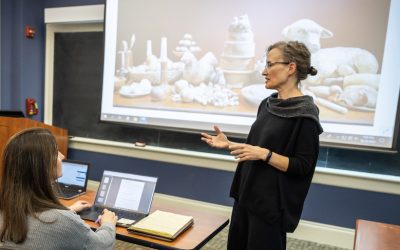Words of inspiration and vision from the English Department Chair and Professor of English and Women’s & Gender Studies
March 2024 – It might surprise some to know that Women’s History Month, as a nationally recognized celebration, has only been around since 1987, less than 40 years. It was preceded by Women’s History Week, created by President Jimmy Carter in 1980 to wrap around the March 8th International Women’s Day, which has been internationally recognized and celebrated since 1911. The day, the week, the month were all created with the intention of recognizing the often unrecognized, unacknowledged, and undocumented contributions of women to all realms of human existence—to art, politics, culture, research, social institutions, and liberation struggles.
Forty years after its establishment, this celebration of the contributions of women from all races, classes, sexual orientations, faiths, and abilities still seems crucial—perhaps now more than ever when U.S. states are closing Africana Studies, Women’s and Gender Studies, and LGBTQ Studies departments in their state universities and banning from K-12 classrooms and libraries materials that reflect the full range of human experience, thought, and accomplishments. Every now and then, when a student comes to me and says “the book we’re reading in your class is the first book I’ve ever read in school that actually represents my own identity and experience,” I am reminded how powerful these basic acts of representation and inclusion can be.
But I do feel somewhat ambivalent about these months or days we dedicate to acknowledging marginalized communities—Black History Month, Hispanic Heritage Month, Women’s History Month, the Trans Day of Remembrance, and many others. We need them, but they aren’t enough. They work only if they remind us that changing the exclusions and blindnesses of our institutions and curriculum is a year-round commitment. So as we come to the end of March, I hope this month serves as a time to strengthen our commitment to work continuously—month after month—toward an equitable university, an inclusive curriculum, and a just society.



